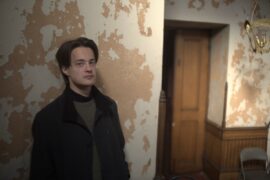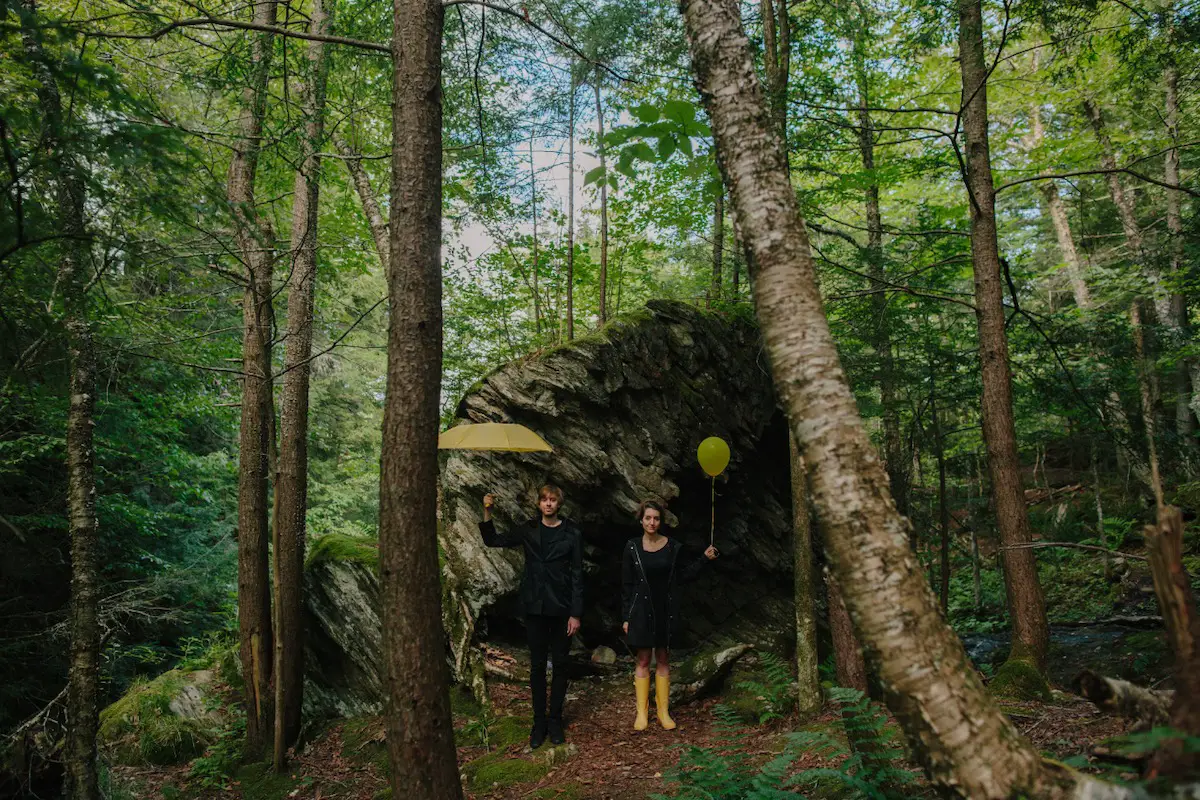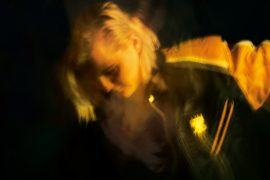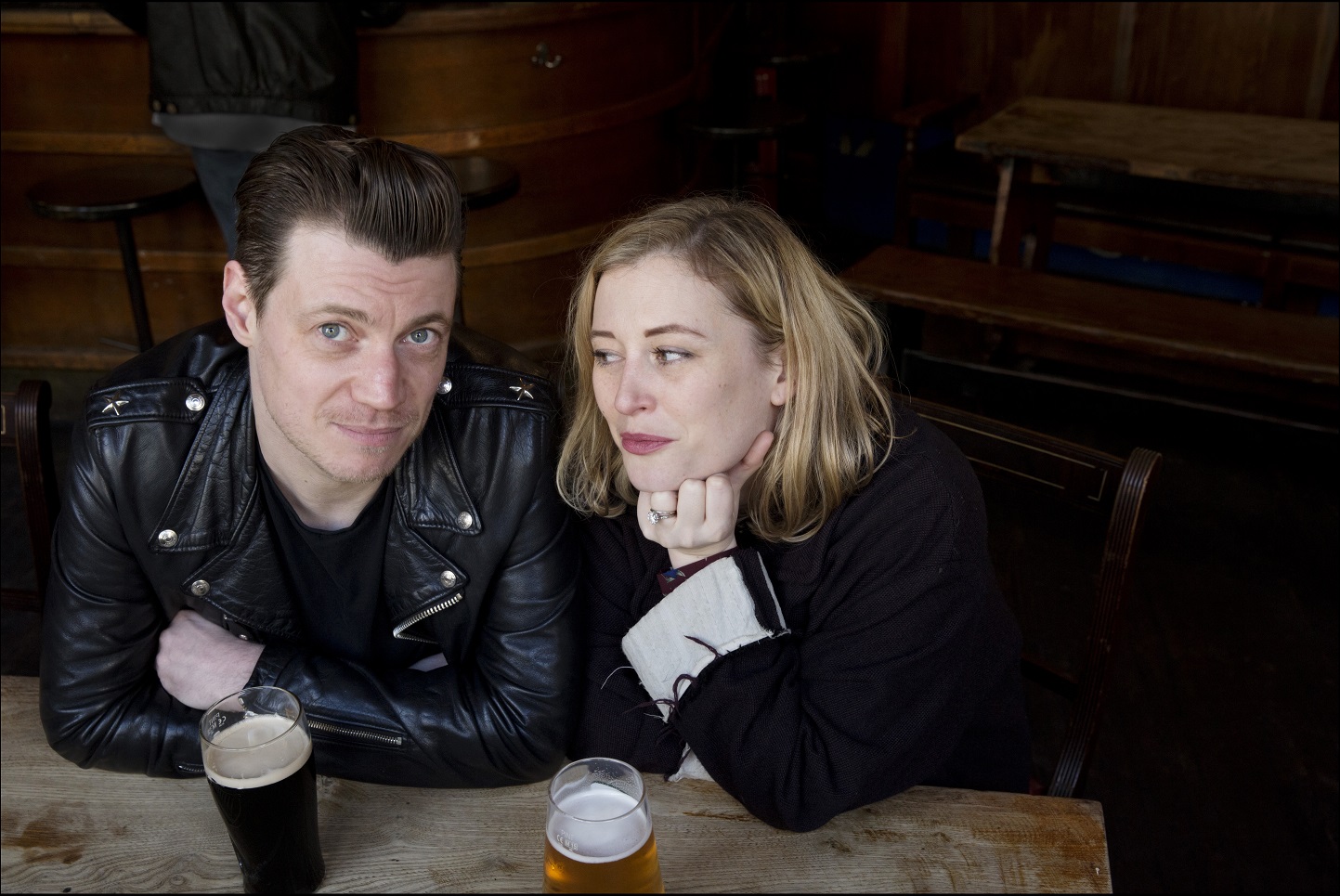In an intimate, in-depth interview with Atwood Magazine, Leif Vollebekk unpacks the alchemy of his fifth studio album and musical masterpiece, ‘Revelation,’ a breathtakingly beautiful record unearthed rather than written, forged in solitude, guided by dreams, and steeped in the pursuit of something just beyond reach.
Stream: ‘Revelation’ – Leif Vollebekk
For centuries, humanity has been in pursuit – of meaning, of self-actualization, of something just beyond our grasp. Philosophers of the 17th Century searched for limitless riches and eternal life, just as many of us still do today – albeit in a different fashion.
Leif Vollebekk’s music has always been about the search. His songs exist in motion, drifting between time and dream, between the tangible and the ephemeral. Over the past five years, he has embraced that pursuit fully, allowing solitude, introspection, and sonic exploration to shape Revelation, an album that feels as if it was unearthed rather than written. With sweeping orchestration, raw live performances, and a deep reverence for imperfection, it is a record that does not demand understanding, but rather, invites discovery.
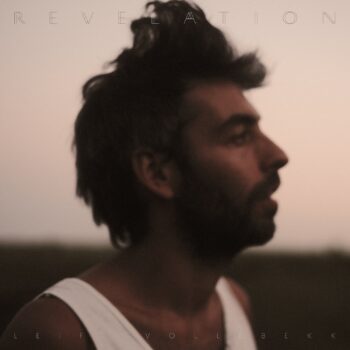
Released September 27th via Secret City Records, Revelation is a lush, cinematic work brimming with orchestral grandeur and the raw intimacy of live performance. Vollebekk, never one to chase perfection in the conventional sense, instead set out to capture something more elusive: a sound that feels lived-in, expansive yet personal, rich with the kind of imperfections that make a record timeless. “All of a sudden, the song comes together,” he reflects on his process. “It doesn’t sound good the take before or after, but there’s this one moment where everything locks in.”
That philosophy extends beyond the studio walls. Our conversation, held just before Revelation‘s release, finds Vollebekk reflecting on the years of solitude and self-discovery that led him here. He speaks of his pandemic-built home studio in Montreal, of his fascination with astrophysics and alchemy, of the significance of dreams — both the ones that shape our waking lives and those that visit us in sleep.
The album’s opening track, “Rock and Roll,” was born from such a dream, gifted to him, as he describes it, by none other than Jeff Buckley. “I woke up and I was like, what Jeff Buckley song is that?” he laughs. “And then I realized – it wasn’t.”
Well, I think I know just where you been
My grandfather, he played the violin
And, babe, I still remember him
When I’m playing
So I’m gonna play just this one note
It ain’t even one of the ones I wrote
In fact, none of them are, didn’t you know
They’re made by the Maker
Of rock and roll…
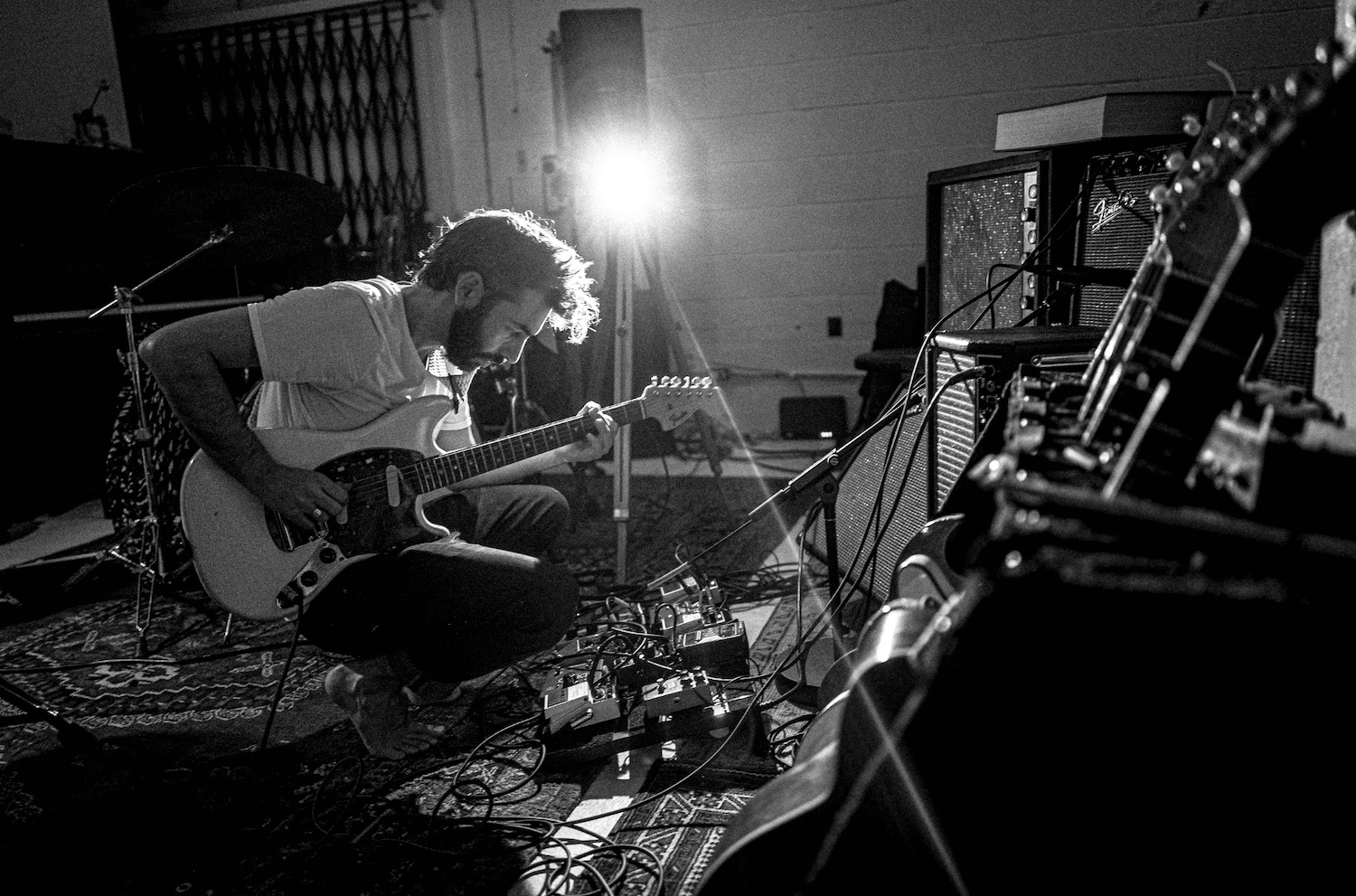
Vollebekk’s music has always felt like a seance, a way of communing with something beyond himself. Revelation is no exception.
Recorded at the legendary Dreamland Studios in Woodstock, NY, the album carries with it a sense of the eternal, as if these songs were pulled from the ether, waiting for the right moment to be discovered, written down, and sung aloud.
“I just wanted a record I could listen to over and over again,” he says. “Something you could put on any time of day, like Hotel California.”
In a candid conversation with Atwood Magazine, Vollebekk peels back the layers of Revelation, from the orchestral swells of “Mississippi” and the sprawling world of “Sunset Boulevard Expedition,” to the dreams and visions that guided him and his art throughout the past five years.
We talk about sound and silence, about the alchemy of creation, about finding a guiding light in a Southern Star, and, of course, about rock and roll – the kind that isn’t just music, but something bigger, something searching, something timeless. With Revelation, Vollebekk has crafted not just an album, but a masterpiece – one shaped by time, solitude, and the endless pursuit of something just beyond reach.
“I don’t know how I made this record, really. I don’t know that I’ll ever make another one like it,” he says.
But one thing he knows for certain: “Writing this music was… the best years of my life.”
Read our interview below, and listen to Leif Vollebekk’s Revelation wherever you stream music!
— —
:: stream/purchase Revelation here ::
:: connect with Leif Vollebekk here ::
— —
A CONVERSATION WITH LEIF VOLLEBEKK
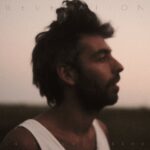
Atwood Magazine: Leif, it's been five years since we spoke about your last album! New Ways continues to have a very special place in my heart. What's your relationship like with that record nowadays? How have those songs grown with you? Is it something that you had in mind as you were going into this next record, or is it a thing of the past at this point?
Leif Vollebekk: Yeah. Oh yeah. I mean, even this record is a thing of the past. I’m always trying to like figure out what the heck to do next and but yeah ‘New Ways’ I was actually, it was all… A lot of it was also just like trying a new way of recording too and similar, but like I went too dry. We did it at Capitol Records and I went, I wanted the drums to be tighter. So then I ended up kind of going too dry on tracks, like “The Way That You Feel” or “Appalachian Plain,” not enough ambience. And then but “Transatlantic Flight” and “Hot Tears” I was really happy with those at the time. I thought these are the songs that are me and this is what I wanted to do. And I worked the hardest on those.
And but really it was like the, the album was kind of focused on those two songs for me. Like I, everything else was like an album song. And then those two were like the ones I was focused on. And, but stepping back, I, when I listened to “Hot Tears” next to other songs, there’s an edge that when I play it live or even in the studio that I think is there. But when I listened to it back to back with other people’s music or music that I like even if it’s like the Eagles or like the Killers or something, it’s it… There’s like a warm blanket hug vibe that I’m not trying to put across and it’s a bit too soft.
And I was trying to get some edges and I was I wanna get… Anyhow it has to do with mixing. It has to do with mid ranges and compression and all this stuff. Not that I really think about that, but anyhow, I just wanted to get a sharper sound then those songs and a lusher… I wanted the orchestra, the strings to be lusher. So basically I’m trying to beat that record. And I was obsessed with beating those two songs ’cause I… ’cause they were the ones that did the best and yet I wasn’t satisfied.
This record had a lot of time to write the songs and I, with no pressure, ’cause I was completely alone for the first three months of the pandemic and I was in bliss. I didn’t talk to or touch another person. I was writing every day and I thought it was going to be short-lived, so I was making the most of it, all this free time. But I really wanted to make a record where every track on the record was the best song on the record. And when I was working on a song, I’d be like this one, if it’s not better than “Southern Star,” then I need to make “Southern Star” the worst song on the record.
That was the first song we recorded, and it was my favorite. So then I was I was always trying to like beat it. So now I feel like every song kind of holds its own and it’s… There’s no real album track. I don’t think on the record, maybe “Till I See You Again,” because it’s not quite as big, it doesn’t have any drums. But anyhow, yeah, there’s a competition within myself about putting myself to shame if I can do it.
You mentioned The Eagles - when I was a kid, I listened to Hotel California every night to go to sleep. But you could just as easily play that album in the middle of the day in a backyard, with your friends – and it hits all the right seasons. There's something special about music that can fit all times of day, and I get that same sense from Revelation. I'm not trying to put it into a box at all; in fact, I think it stays out of boxes, and I think that's very cool.
Leif Vollebekk: I know it’s been a long time. It’s just weird. This was a very long time. I’ve been gone five years. I’ve only been thinking about this record the whole time. So it’s any year since we last spoke has been about this record. I spent some time with my parents at their cottage, and my dad that’s where he listens to his music. He just has this Eagles greatest hits record, and he just flips it and he flips it and he flips it. I swear to God, I never get tired of it.
I just don’t. ’cause at any point, I’m listening to the lyrics, or I’m listening to how good the guitarx sounds, or how good the harmony vocals sound, and it’s still a live take. So it’s not on a grid, so every drum hit still has a little bit of information in it. Once I’ve absorbed a record, I stop listening to it.
You haven't absorbed that record yet.
Leif Vollebekk: No I can’t. I kind of kept thinking about that record and John Lennon’s “Imagine” not the track, but all the other tracks on that record and the Bonny Light Horseman record that I listen to ad infinitum. Those three records I kept listening to them over and over again, and they never died. Even the Bonny Light Horseman record still sounds perfect to me, that first record. So I was like I just want a record I could listen to over and over again. What are the keys? It’s harmonies, orchestra, great drummers the best drummers in the world. I’ve got a drummer who played on “Imagine,” I’ve got a drummer who played on the Bonny Light Horseman record, JT Bates. I haven’t played with anyone from the Eagles, but I’m holding out for Joe Walsh on the next one. That would be great. But yeah, I want these records to be beautiful and listenable over and over again, at any time of day, like Hotel California.
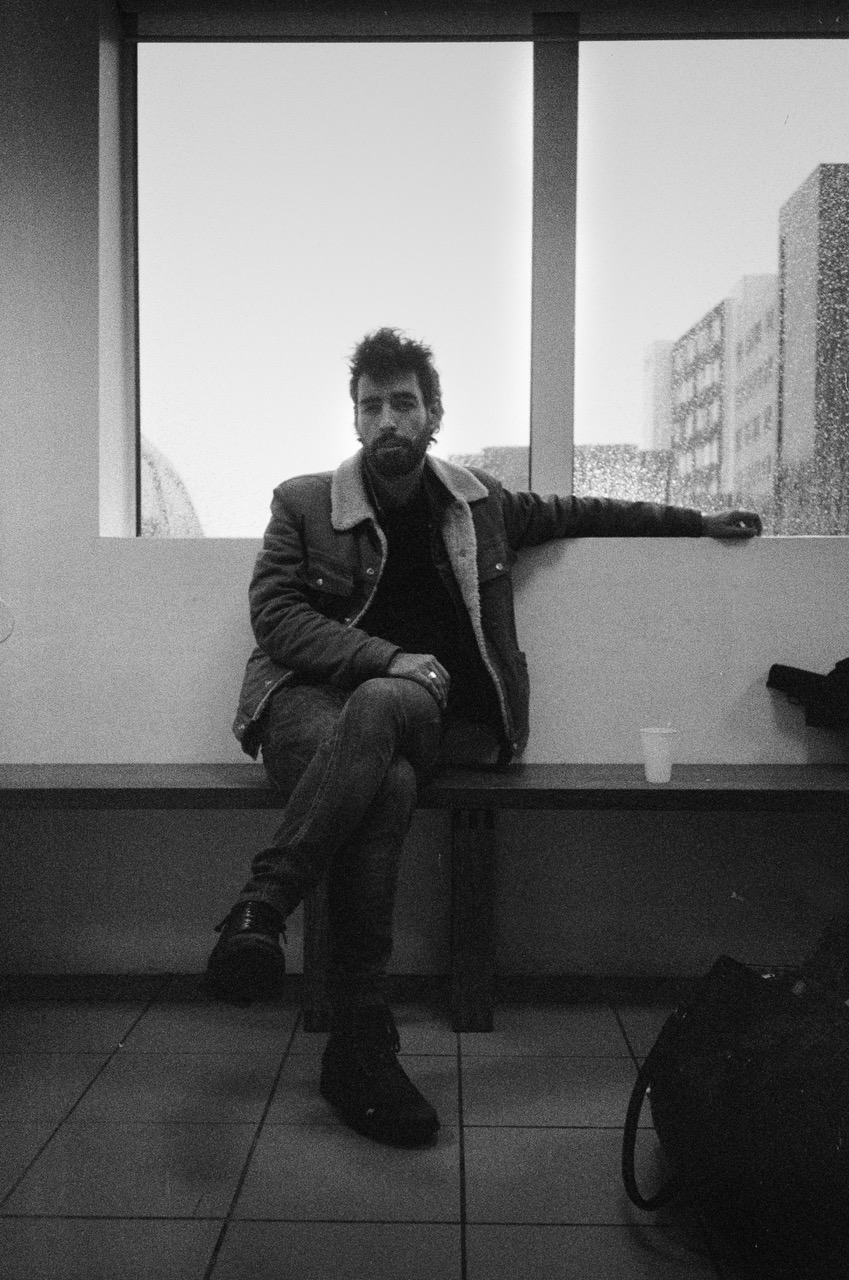
Leif Vollebekk: What happens is that I listen to… I can’t work on a record if I start hating the song. I do the live vocal with the drummer, with me playing, like those old records were done. Though John Lennon overdubbed his vocal, which to me makes sense to me, I didn’t do that. I can’t do it. I don’t get the vibe from it. And then if that on it’s own is exciting to listen to, somehow that it makes everything possible. There’s actually a moment that I can’t duplicate and the next take always sounds like complete crap and the one before… We always just pick a moment where all of the sudden the song comes together. The drums sound like somebody tweaked the microphone sounds. It’s that one take locks in, in a certain way not too tight, not too loose. All of the sudden there’s a… I swear to God it’s like I’m listening to the record it’s already done. I can already hear the… I can hear the orchestra, I can hear what the guitars are gonna do, I can hear the harmonies. But then I just fill in the holes after. But the record is done after we do that take. So then it’s fun to work on ’cause I’m just trying to bring out what I’m hearing in my head. I don’t know how to make a record the other way, building it from the drums up; then, I don’t know what I’m doing. And what it means is that then you can listen to it over and over again, ’cause you don’t really understand it. You didn’t plan it out much. Like on this one song, “Sunset Boulevard Expedition,’ we did one or two takes with Jim Keltner. He comes in and does a false start ’cause he comes in at the wrong spot ’cause I held the chord too long. He goes, “Oh, I can punch that. Sorry about that.” I said, “No, no, it’s good.” I’m gonna build the whole orchestra fill around it. And then the second time he comes in, the orchestra’s unleashed. So it’s this thing where it’s like that’s what I make the orchestra do because a mistake that Jim did, which is not a mistake at all it was that I played too long and then we missed the one. And then all of the sudden it’s the coolest, it’s a double drum fill and it’s my favorite part of the record maybe. And then my engineer Harris Burt, he looked at me and he was like, “We have to leave that in.” I said, “I know, right?” Leif Vollebekk: It is. Leif Vollebekk: I would make it differently if it was fun and I was inspired, but I’m not. It’s not a judgment on anyone else, it’s just that I can’t get excited about making it like a blueprint and an architecture.Like a double, double whammy. That's awesome. I want to get to that song later, because I think it's your longest song ever.
It’s amazing to know that behind every Leif Vollebekk track, there's a live band in the studio. Regrettably, it’s not how a lot of people make their music nowadays.
Last time you came up in conversation for me was last year, with your good pal, Gregory Alan Isakov. We were talking about his last record, and I think he approaches music in the exact same way; it's a communal experience. Sure, his name is on it, but there's a whole family behind those songs. I think it's special when music made that way.
Leif Vollebekk: It definitely has a different energy. Yeah, I think that’s the thing. All the records that I really like, I don’t really understand why I like them. My favorite song ever is probably “You Can’t Hurry Love” by The Supremes. If you listen to that song it sounds like it just happened, every time you listen to it. It just feels like they recorded it five minutes ago. Here’s the tape, get it on the radio right now. It just feels… And I see all kinds of stuff when I listen to that song. There’s no digital black and here’s the arrangement, let me show you. Sometimes, I feel like recordings are let me show you how the song is arranged. Let me show you where everything goes. Almost like a Marie Kondo thing, and the vocals are here and then you get a live recording like Motown stuff where you can’t separate any of the sounds. You’re just blown away by the energy. I feel like I can tell that there’s linoleum on the floor and that there’s a chandelier half broken on the ceiling – like, I feel like I see things that aren’t even there! It’s wild.
This brings us to an album that is, I guess, five years in the making. Can you share a little about the story behind Revelation, and what it means to you?
Leif Vollebekk: Yeah, the songs came out one by one, but one of the wild thing that happened was that I was quiet for the first time in my life. I’m a chatty Cathy, I was so quiet for the first time. We were supposed to go on tour fall of 2020 and 2021, and it kept getting delayed. I remember being like I had all these songs I felt were coming in, and I was afraid I wouldn’t be able to get them. When everything got canceled, I was secretly I was delighted. There was a lot of pain and stuff, but for me creatively, it was a gift. I started dreaming again.
On my record, Twin Solitude, I had a lot of place names, and at one point, I was like I can’t write another place name song. I gotta stop doing that. And I had the wherewithal to go let’s see how many place names I do, like who cares. I wasn’t trying to do it on purpose, but I didn’t stop it. Then all of the sudden I wrote more songs than ever written in my life, I have songs that I didn’t even release that have more place names. It’s what I wanted to do. And then all of the sudden I stopped doing it, I got it out of my system. That was a place-name record and it felt more like a road trip record, and so be it. Then I was like thank God I didn’t say no to that. On this record, I kept having dreams and then I kept using the word “dream.”
I kept on having songs about dreams, and I was like this is different it’s literally the same word over and over again, and I just let it go. And I don’t really write… Anything I’m coming up with now doesn’t really have any dreams in it. I had a dream… I had a really good friend of mine that passed away. I think we were 23, maybe 24, and he’d been my best friend forever. And then we kind of grew apart, but the last time I’d seen him, it was like I felt we were gonna reconnect, and back on the same page. I thought he was gonna be my friend for the rest of my life, and he passed away – had a car accident. It was a long, long time ago, but during the pandemic, I was reading Carl Jung, I was just dreaming more and I was paying attention to my dreams, and he started visiting me in my dreams. It was surreal, and it was so wild because he would just show up and we’d have these wonderful conversations, and then all of a sudden I’d go, “Wait a minute…”
This wait a minute feeling like, this is a dream. And he’d look at me kind of like, “Ah, shit, the jig is up,” and he’d disappear. Or he’d tap me on my shoulder and I’d turn around and he’d be gone. And it happened three or four times. And so there’s a lot of wild things that happen. And so there’s a little bit of him in this record.
I’m so sorry for your loss, but I’m glad to hear some of his ‘DNA,’ or his spirit, made it into these songs.
Leif Vollebekk: Thanks. Yeah, not to get too mystical, but I had a… What’s really wild and I can’t make heads or tails of it, I was learning a lot of Led Zeppelin on the guitar because I was like, “When this pandemic is over, I’m gonna go start a Led Zeppelin cover band,” so I was learning “Black Dog” and all this stuff and “Rock and Roll.” And I had a dream that Jeff Buckley and I were rehearsing, and I had so many wonderful dreams where he was teaching me this song, and then all of a sudden, he started screaming in his falsetto – you know, he goes really high up.
And he was singing “Rock and Roll” and I was following his hands – it wasn’t Led Zeppelin’s “Rock and Roll”; he was just screaming “Rock and Roll” at the top of his lungs. I was following his hands and I woke up and I was like, “What Jeff Buckley song is that?” and I realized, “Oh my God, it’s not a Jeff Buckley song,” and I wrote down everything. So this first track on the record is this song that Jeff Buckley taught me. The only thing in the dream was that he sang “Rock and Roll” over and over again with the changing chords. Like, 16th notes. I was playing it at the end, I started doing the scat sing, scat thing like shoo-be-doo wop just like Little Richard. When I was a kid, I loved Little Richard. I thought, well, that’s weird. I’ll just have to cut that scat thing because that’s really ridiculous. And then three days later, in The Guardian, it said the architect of “Rock and Roll” Little Richard has died.
You got to keep it in now.
Leif Vollebekk: That’s it exactly. And that’s why it’s in there. That song is just like, that was the first song I was like, “Okay, what the heck’s going on?” So I just kept following the rabbit down the hole. I thought I was going to figure something out, and I didn’t figure a thing out. The dreams eventually dried up and stuff, but there was a period where I was just having these dreams. They would be a missing scene from a song, or they would be the song, or there would be a vision, and I’d start writing it down the next morning before I’d forget.
I’ll never make another record like this… I told my mom, I was like, “I think this might be that for me.” She said, “Don’t say that,” and then she went, “Oh, I see what you mean.” We went to Budapest with the orchestra, got all my favorite players on the record, and I had all the time in the world to dig out these songs. For me, this is a very different record, but also kind of down the way I’ve been doing it. But I don’t know that I’ll be able to make a record like this ever again, ’cause I don’t know how I did it, really. It’s such a heavy thing, going to Budapest with the 25, 28 piece string orchestra, singing the arrangements over Zoom to my arranger, now friend Chris Elliot… it was just a whole thing. And it took me five years.

You would have started the album at some point in 2020 during the height of the pandemic. When was it finished?
Leif Vollebekk: I was going to record in 2020. I was just like ready to rock. And then the thing was, I’m really stubborn and I wanted to record at Dreamland in upstate New York where Bonny Light Horseman recorded the record. That was just the best sounding studio I could… That I’ve ever heard really. And you may not know this but there was a rule you couldn’t drive across the border in 2020 because of the pandemic. You could fly but you couldn’t drive. So I don’t know why. And when I record, I bring all my gear. And so, and I mean like a lot of gear, like pedals, guitars, tapes and microphones. Can’t fly with that stuff. So I was like, well, as soon as it opens up, I’m gonna, I’ll drive down. And it didn’t open up until 2022. And so that was it. And we ended up doing a tour in there, too. So I was, but that meant that I just kept, oh, maybe it’ll open. ’cause I don’t even remember, we never knew when the world was gonna open up again. It was like every two weeks, it was like the weather report, emotional weather report.
Oh, no, world is closed for another three months. Yeah. So I just kept writing songs. So it’s kind of like I just, well, all right, then another song came along, then another song came along, then “Mississippi” came along, then “Peace of Mind” came along. So, and then we went on tour and then so then I basically recorded the whole thing. We started in the winter fall of 2022, and then we recorded all through last year. Yeah, and then I think I mixed. I mean, I don’t even know. Who cares? It’s the most boring part to know that something didn’t come out, wasn’t recorded yesterday I guess.
But it took a while to do the string arrangements because I was obsessed with getting the right orchestra sound because I didn’t like the orchestra. I never liked the strings on my other records. And so I wanted to… I knew that I needed a thicker, there’s only one way to get that sound is having like, dozens of people playing into a few microphones vibrating in the room getting all those string players together. That’s how you get that thick sound that really like blows your socks off. And I think, anyhow yeah, yeah, it’s just, it’s a lot.
You can't just take a 25 piece and double it four times into a 100 piece?
Leif Vollebekk: Well, that’s what I did. On the other records, you know, I had a quartet and I’d double it or triple it. And then just funny things happen, each player is different, is the same. So they have… There’s… Not to be too technical, but the white noise from the bow on a violin, it’s like… It’s in there. And so if you use the same bow on the same string with the same player, same note that white noise starts to build up a phase and it’s either in phase or out of phase. And so you end up like getting this buildup of certain frequencies that you’d never get in an orchestra with a different violin, with a different bow. And it’s really, seems really nitpicky, but if anyone could hear the difference between a doubled, doubling a quartet or quintupling a quartet and hearing an orchestra, you really, it’s just crazy. And it’s the difference between having 20 people sing into one microphone than to have 22 microphones. You’re also increasing how many microphones you have and then how much noise is in each microphone.
It’s really weird. But like at one point, like, what is it that we’re trying to listen to, it’s just… It’s a weird thing to think of that it’s not math, or it is math, but it’s more… It’s a deeper kind of math where it’s actually about each bow on each string. This guy Rob Moose, who’s a great violin player, he played on the record too, on “Southern Star,” on “Elijah Rose” and on songs that didn’t want the full orchestra, but wanted an orchestra. And what he does is he, like septuples himself, he plays him, he plays many, but he is got… He uses different bows and he’ll use a couple different violins and stand in different corners of the room so that he doesn’t get this phase buildup. It’s weird. There’s a reason that orchestras are orchestras. You don’t go to the orchestra and expect to see a couple people on stage. You wanna feel that that air get moved in the room. And that’s why “Take It to The Limit” sounds so good.
How do you feel your experience at Dreamland Studios impacted the overall sound? Were you able to create there what you were not able to create on Twin Solitude on New Ways?
Leif Vollebekk: Oh yeah, totally. I just knew it sounded amazing and we actually, we played at Levon Helm’s Barn in May of 2022. And I think that’s when it was. And I ran with the guy who was doing sound for me, Harris. He’s a great engineer in his own right, like recording engineer. I ended up asking him to record the record. So we ended up on tour. We borrowed a car and we went and drove to the studio, check it out to make sure the pianos were right ’cause I base the recording around a piano, so like, if I don’t like the piano, I’m not gonna record there ’cause it’s like… That’s the other instrument I play.
It is weird with pianos, everyone else brings their guitars and their violins and then they expect you to play whatever piano is around when you’re a piano player. But they had a Steinway that was amazing and this… I forget what the other one is two, but they have two grand pianos and one of the grand pianos is in its own room, isolated. And one of the problems I had getting the sound that I wanted on “Hot Tears” and “Transatlantic Flight” was because everybody recorded in the same room with not a lot of isolation. When you turn up the drums to get a bigger drum sound, the drums were also getting the piano from 10 feet away. So technically you’re turning up the room mic on the piano and you’re getting a faraway piano sound. Like bleed. But I was like, I learned about bleed the hard way, so I was like, what we did was… But the sight lines are great.
This record is the first record that I recorded, everything’s live, but there is just glass between the players, it’s not a big deal. But on “Rock and Roll,” I couldn’t take it anymore ’cause it was too isolated. So “Rock and Roll” was recorded, tons of bleed next to the drums, like, so it would be a rock and roll song with lots of bleed. Same thing with “False-Hearted Lover” but the other songs are isolated and we were able to get the sounds we wanted, we got the sounds. Oh yeah.
And Jerry Morada, who runs the studio, he’s this drummer for Hall & Oats, Peter Gabriel back in the day, all his drums are there and I’m obsessed with drums. So we could use… I don’t know if he knows this, but I used all his drums. We got to use, I get to be like, nah, it’s the wrong snare drum for this song. I’d pick out between all of his snare drums, I’d like pull out this. I pulled out this piccolo snare one time for “Mississippi,” and I pulled out this other snare drum for “Elijah Rose.” And so we were able to like, just like get the tones, like Peter… These touring drums from Peter Gabriel’s tour were there too. So it’s just like we could use… And it’s a state state-of-the-art studio right before everything went digital. So it’s like a museum. You can just, it’s all there. They’ve got Hammond Organ, amps, everything.
It’s amazing to hear that this record came to life through your own volition, and you let it take its time. So often, there's a rush to get the music out there, and it sounds like you really tried to pull back on the urge to get the songs into the world and you really let it sit until it was right. Was that real hard to do?
Leif Vollebekk: Well, sometimes it was imposed from the outside in it was a real… My patience was tried, but it didn’t go over the limit; it was like, “Okay, can’t go to the States, so I’ll write,” and then I ended up taking up gardening. I started building things. I built my studio, I was able to spend more time with my family. Like I was like, I just did stuff that made me happy. And then of course I was thinking, okay, I’m not going to work on music and there’s nothing to do. And then it would help me write of course take your eye off the ball and the… There’s that thing where if you try to look at, focus on a single star in the sky it’s actually in your blind spot sometimes. And if you look to the right, then you can see it. And this is a blind spot right in the dead center of your field of vision and a little bit like that, just taking your mind off things kind of moves things along and then Chad Blake mixed the record.
Though I had, he was busy for a bit. There was like a period of like, okay, he, he can mix the record in a month or so. So I had to wait for that. And then I was blown away by his mix, but there was a lot, I was just like I don’t wanna mix it quickly. There was that too, where at one point it was just like, I’ve worked so hard on this. I’m not going to just quickly do this or like not really care about the orchestra at the end. And like I said, these songs were so… Came to me in such a different way and they were so like introspective, and I just loved them so much. I just wanted to carry them through to what they wanted to be.
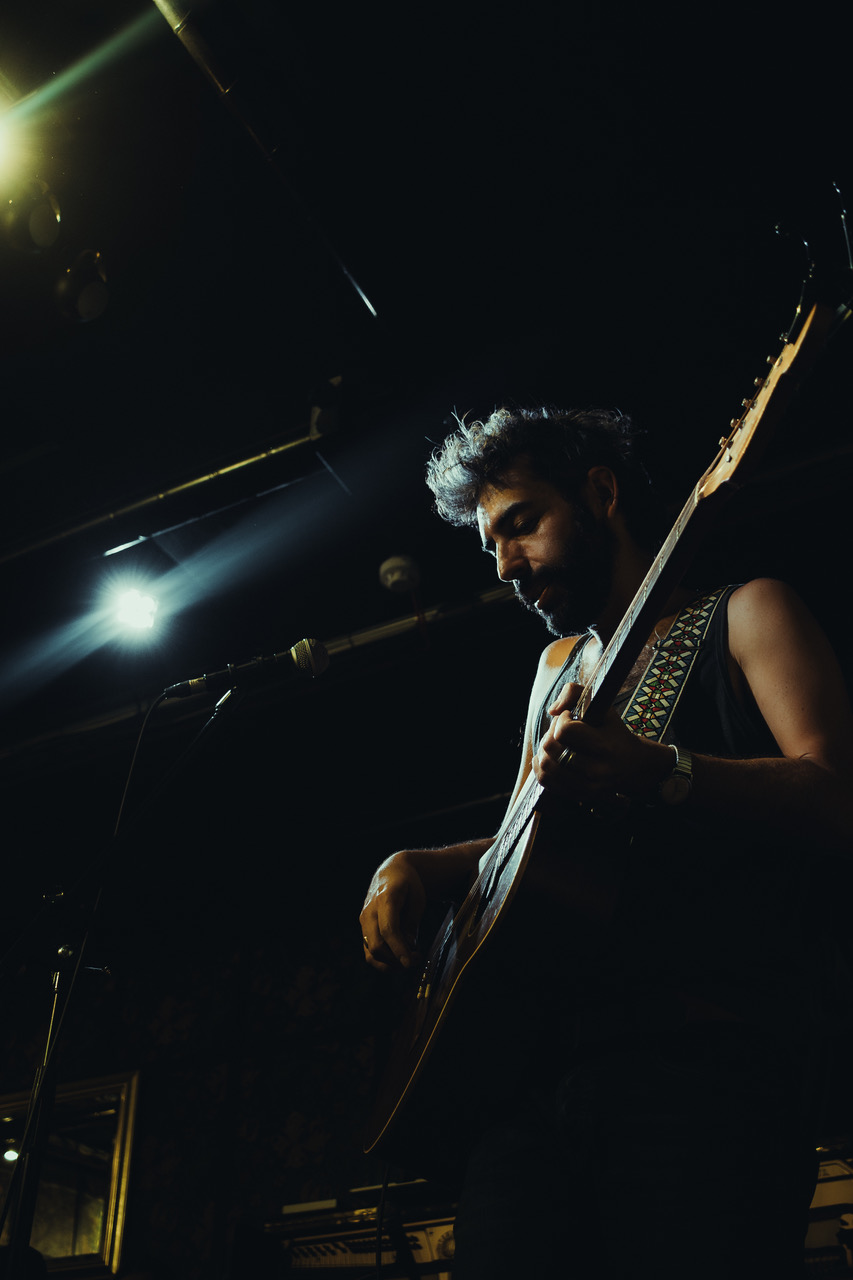
I can so hear the love you have for this music. It's obvious in every way that you were talking about it. Why the title Revelation?
Leif Vollebekk: It’s a bit pretentious, but I was like I love Sharon Van Etten’s, that record she had ‘Epic’. And I remember thinking what, when I saw her play at il Motore in Montreal now it’s called Bar Le Ritz like a million years ago, she had that record out. And I was like, I remember going like, I would never name a record Epic cause I would be afraid of people thinking it was pretentious. And yet when I saw that she did you like, you just like, you just get excited about the record. And I got excited about her and I could tell that she was like, she wasn’t saying that she was epic. She just like saying the word it’s like that Bob Dylan record ‘Desire’. He’s not saying like you desire me. Like he’s not saying anything. He’s just saying, think about it. What does what does it mean to you? And just kind of puts you in a place and a word that and that Gillian Welch record the ‘Revelator’ that’s a pretty big, like bold, like it’s a big, it’s a bold and those are the… These are the records that I really… I collapse into their like warm arms. They just hold me and they go, yeah, like we’re ready for any emotion as big as you want to get. I’ll hold you. You are in good hands, my friend. And it’s never about the artist.
Like I was saying, I was getting all these crazy dreams. I started chasing the rabbit a little I got really into the “iChing” and I got really into… During the pandemic, I had all this free time. I started getting into all this stuff that I wanted to study, which is I used to wanna go into astrophysics and I never did. I took the easy way out. I went into philosophy ’cause I was like, oh, on day one, you start to play with the universe but I was always secretly sad that I didn’t get to like go down study quantum physics or physics or molecular biology. So I just started listening to podcasts and reading about it. And all of a sudden I thought I was like reading the “iChing” and reading about Newton. And I was like, there were two different things I was into spiritual stuff, like physical stuff.
Then at one point I hit this thing where I started reading and I guess they buried all this stuff about Newton ’cause Newton’s family didn’t want anyone to find out, but he was an alchemist and he had an alchemical laboratory, a laboratory in his backyard. And he was trying to find the philosopher’s stone. Most of his books were about alchemy written in code. He was reading about like in the Bible to find clues about how to, just the in the book of Revelation reading about dragons, the green dragon symbolizing I don’t know, like mercury sulfide or whatever it is. And all of the sudden this guy that is like the pinnacle in our minds of scientific reason and complete, like almost esthetic scientist, it turns out that he was obsessed with the book of Revelations and eternal life and the search for…
Synthesized gold through alchemy. And you go, like, of course, alchemy was eventually became chemistry, but actually, the alchemy… And then I started, in each… And Carl Jung talks about alchemy, so that’s why I was like, wait a minute, everyone I’m into is interested in alchemy. So I started reading books about alchemy. And they’re always talking about the moment of revelation. So I just, but I never got, I’m… Obviously, I never got there. But I always kept thinking like, somebody’s gonna tell me what’s going on. Like one of these books, I’m… Amazon made a fortune off of me during the pandemic. Yeah. But I just got so, I was just so fascinated by it that all these people were looking for revelation and the idea at one point is that the alchemist has to have a pure soul and heart while he’s synthesizing the materials like while doing the physical work of just going okay like turn the mercury… Isolate the Mercury from the sulfur and then add the aluminum and then add this And then he also needs to be deeply pious. And it’s like then the idea is that God then gives you the gold because you did the work. But also, they were very spiritual people. It was these other dudes that were awful that were trying to make fake gold and make money and scam people.
And then what’s wild is that, the more I read about astronomy and stuff and astrophysics, all of a sudden you find out that the only way that you make gold is when there’s two neutron stars that collide or there’s a supernova. Those are the only two ways to make gold in the known universe. Like, that’s it. Those are the only ways. And those are oceans of fire, that’s what they talk about. These alchemists were saying that there’s one thing. There’s a fundamental principle that makes everything that can make any gold, any metal, including gold. And gold was the one they were after. So it’s this weird thing where at one point, I go like, “Did they kind of know?” In the periodic table elements, I’m not going off on a huge tangent here, but what you have is… They say that from lead with mercury, you can get gold. They’re always talking about those three elements. And they sit next to each other on the periodic table of elements. And I find that just weird.
But I kept going, somebody must have written about this, but nobody has. And I don’t understand. And then eventually, I think it was 10 years ago, somebody actually went, “Well, let’s see what happens if we bombard lead with neutrons. Can we turn it into gold?” And they did. Because for a fraction of a fraction of a fraction of a second. And everybody laughs at the alchemists; I’m not saying that they ever did it, but I’m saying that they were correct that everything is transmutable.
It’s just wild. It was this period where just for maybe about two years, I just kept reading these books and looking at the wild connection between how the universe works and how these spiritual mad scientists of yesteryear weren’t that far off, and yet were, and I was just thinking about that stuff… and so anyway, so I think Revelation kind of comes out of that – but it’s not like anything other than I just like the idea of thinking about it… aiming for something like that is so noble.
My little knowledge of alchemy is that they were searching for two different things. There was gold and riches and wealth, and you also mentioned the philosopher's stone, eternal life. These two bounties. What I'm hearing is that we humans have always been consumed with the exact same things – money and eternal life.
Leif Vollebekk: That’s so funny. Yeah, that’s the ironic way of looking at it.
It really is. Like, they're all human at the end of the day. Like, even Isaac Newton didn't wanna face his...
Leif Vollebekk: But he didn’t care about the money. Well, if you read about Newton, your mind’s gonna blow up, ’cause by the end, he actually started working for the royal mint. He ended up working in money. But that way, he was not obsessed. He was just really good at finding forgeries and stuff… He’s a really wild guy.
So this moment of “Revelation” is this moment of ‘eureka!’ It's the thing that nobody ever got.
Leif Vollebekk: Nobody. I don’t think so. But maybe.
They believe that there was an eventuality, and they could never reach it. So, this album is essentially ‘the unreachable.’
Leif Vollebekk: I guess. I don’t know. I just start telling you like where the word was coming up, but I don’t know. It’s closer to whatever Sharon Van Etten meant by ‘Epic,’ that’s what I mean. I don’t know.
I'm gonna go give her a call.
Leif Vollebekk: Yeah, please do.
Because I want to talk about a couple of the songs themselves. “Flowers wilted when a day's got hard. Slow motion wheels on a fast-moving truck. I'm driving around just to pick you up but I can't find you,” you sing on “Rock and Roll.” It's this beautiful slow burn that eventually opens up into what I would describe as a ‘liberating reverie.’ You talked a little bit about this song coming to you in a dream by one of the most revered singer-songwriters to ever live. What inspired the choice to open the album with this track?
Leif Vollebekk: You know what, I didn’t feel like there was a choice. It was like I wrote it, and I was like, that’s the first song on the record, which is how I felt about that song, “Vancouver Time,” records ago. When I wrote it, I was like, well, that’s the first song on the record. It was really, like, I just knew that’s the first. It felt like… I’d written “Southern Star” before, but “Rock and Roll” was the first thing. I was like, there’s a bunch of new songs coming, and this is the first one. So it was just supposed to be the first one. And of course, then it felt like the opening of the record too. Like just kind of in that Eagles thing, running down the road trying to loosen my load. And it’s a little, it’s very, I was very Eaglesy, like a lot of driving. I was doing a lot of driving back then. And so just opening, the open road kind of feeling for sure.
It feels very much like you're singing not to a person, but to an idea. I know we can't get too into specifics per se, but who do you feel you're singing to in the song?
Leif Vollebekk: Well, I mean, the love of my life, probably. ’cause it’s also just like, it may be about a dream. That’s the thing about songs. It’s like when you do have a dream, you’re like, yeah, I dreamt of my cousin, but my cousin was also… It was also this lion that was trying to like borrow something off me, and then… But when I turned around, I was actually teaching a seminar on rabbits, and it, that’s dream logic. And it’s just, and what is it is, that’s what’s going on. And so everything kind of like blends and I whenever I try to like pin it down I inevitably am punished by not writing a song for another five years and so it’s like… It’s just how it goes I guess but yeah it just kind of I’m in the dream.
You’re in the dream and songs are dreams and they mean something to you one day and then a couple years later they mean something else. And then maybe five years after that, you find the true meaning. And then the true meaning ends up becoming the first meaning you had. It’s hard to pin it down. But I kind of sing… I’m singing to my partner. I’m singing to, my grandfather makes a little appearance. Yeah, there was a lot of death, I guess, around me, but somehow it wasn’t the end, there wasn’t a lot of death, but like a lot of, no end. So it was this really beautiful feeling in that song anyways.
I love that “Rock and Roll is the answer” – I feel like we haven't heard that sentiment in 50 years.
Leif Vollebekk: Yeah. I snuck it in there. Like, yeah, the Neil Young thing, I guess I guess he sings about rock and roll and then there’s so much of that. But yeah, I mean, when that… There I was writing the song and all of a sudden, the song was ending. I was writing it and it was starting to collapse, like just like a dream when when you go, okay, wait a minute. You passed away 20 years, like 10 years ago, 15 years ago. And then the dream starts to collapse, kind of like inception or something because you’re waking up. And so all of a sudden it was like, I started thinking about my grandpa, who else passed away when I was young. And yeah, I say, yeah. I’m gonna play this one note and even one of the ones I wrote. In fact, none of them are. And I’m thinking about it ’cause at one point I’m writing the song and I go like, I wrote this and I’m like, wait a minute, I didn’t write this. And then it made its way into the song. The dream itself is, the feeling of dreaming is in the song too. And I kind of wake up from the song. So it’s like, yeah. And that was what I want to put in there. I was like, I don’t know who wrote this song. It’s made by the maker of rock and roll.
And then what was really freaked me out is that three days later, can you imagine a headline that says the architect? I didn’t know that little Richard was called the architect of rock and roll. And so I was freaked out. I was freaked out. Like I said that it’s, this song is made by the maker of rock and roll. And like, what the fuck does that mean? And then so I was like, this song is just a trip. It’s just one of these songs. I don’t know. I don’t know what it is, but it just feels great to play, I tell you.
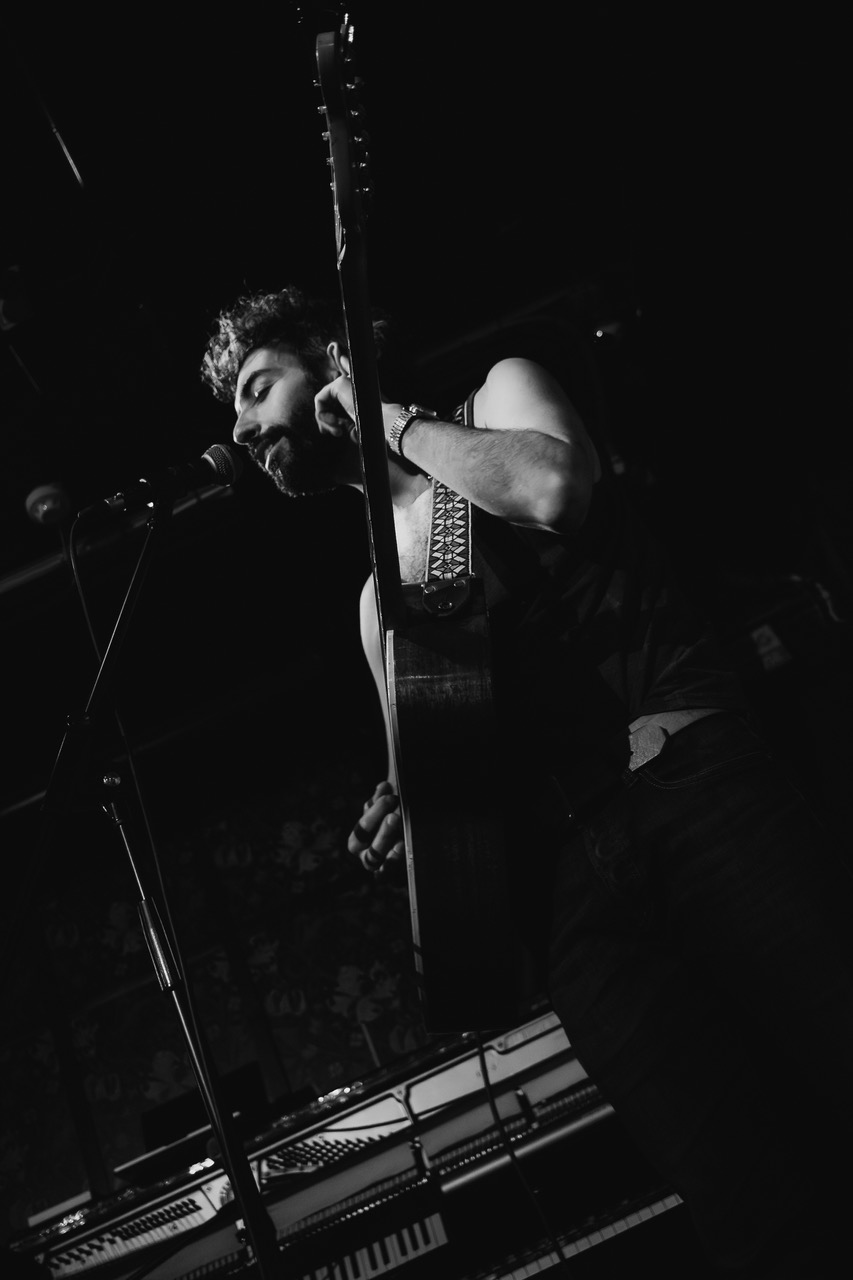
I believe that. It feels great to hear it, too; it’s refreshing for my young ears and old soul. Then you go into the next song, “Southern Star,” “Big dreams, they move slowly like a fog across the plains.” And we're right back in it. We all know what a Northern Star is. What's the significance of a “Southern Star”?
Leif Vollebekk: We’re right back. I know. I was obsessed with the North Star and my dad is a land surveyor. So he, back in the old days, they had to actually use Polaris to set up their surveys. They would actually use, they’d have to. And so I was, he was always like, that’s Polaris. And I thought he knew all about stars. Turns out he mostly just knew that one. But his dad, was a Nor… He was in the second world war he was a Norwegian navigator and I guess he was telling me that he used to like actually chart the seas and he would have one of those, I don’t even know what they call them. He’d look at the stars and figure out how to navigate from the stars at night. And he’d been to… The more he told me about him, the more I was fascinated. He’d been to Antarctica, before the war, Horn of Africa, Japan. I never met him, but when I went to Australia for the first time, I saw the Southern Hemisphere stars and I’d never seen them before. And it dawned on me that the only other person in my family that had ever seen these stars was my grandfather. And so it was this beautiful moment to… I didn’t recognize a single constellation it was so… It was like visiting a foreign planet it’s new stars and there’s no Polaris there’s no Solaris or whatever. There’s no “Southern Star” down there. There’s the Southern’s cross, which points to the general direction of the South.
So there was just some, this feeling of like, there’s like this invisible Southern point. I guess if you have a really, really, really deep telescope, you can see it. There’s a “Southern Star,” but yeah. So there’s just something about someone that guides you invisibly, I guess.
Chasing something that doesn't actually exist…
Leif Vollebekk: But it’s there, it’s there. Yeah. I don’t know. But it just kind of came out like that. I felt really bad after writing it too, because all of a sudden I was like, “Oh my God, I’ve toured with Greg Isakov a bunch and he always plays the song ‘Southern Star,’ but I’ve literally wrote the song completely unaware…” I didn’t draw the comparison at all that he had a song called “Southern Star.” I tried to change it to Shooting Star or something. It didn’t work at all. So I apologized to him, but I feel like I owe him another apology.
“Southern Star” is a phenomenal track and I loved that it was one of the singles. I was also moved by the lyrics in lead single “Moondog”: “I'm breaking free with a deeper will. The one I see is a seeker still. Always reaching, never teaching. I know nothing, babe. Who am I to instruct? Moondog...” What's the significance of this song, this message for you? And why make it the introduction to your new album?
Leif Vollebekk: Oh God, I don’t know. I think it just felt like a fresh, but somewhat familiar song, that kind of thing. It’s kind of like, I think any of the songs could have been an introduction to this record. They all kind of have a spot for me where they all, like I said, I wanted them all to be my favorite track. And at one point they all were. And yeah, but I, yeah, I love that you picked that verse ’cause that, that was a verse, like that… Those lyrics just came out so easy, so easily. And yeah, my partner sometimes like, oh you’re my teacher. She goes, oh, you teach me stuff. And I’m like, oh man, not me.
Of course I’m a huge Dylan fan.., I think of him and Prince as my teachers. And on these records like you… What I realized is that whenever I listen to an album I love, I always like the record where the artist is reaching for something and doesn’t get it. And, but inevitably, and sometimes they get so close and then on the next record, they’ve got it figured out and they’ve got their sound and they nail it. And it’s not good.
I mean, it’s good, but it’s not a capital G. It’s just good. But there’s the one where they risk everything and they try to just… They’re like reaching out and they’ve got a nail on the idea, barely holding on, like off of a cliff. And that’s what I want from music. And that’s what I want from any artist. I want them to like, barely, it’s the reaching itself is the thing. Yeah. So I just think about that.
Speaking of reaching, one of my other favorite songs is “Mississippi.” What I love beyond what you're singing here, is just the vibe and the sound. I feel like this captures the spirit of our ‘Revelation,’ what we were talking about at the top of this conversation, about the sound that you were chasing the whole time. Can you put into words what it feels like, and what you're chasing?
Leif Vollebekk: Yeah, well that’s the very last song we recorded for the record. That one was, and it was the first thing I tried. We had five different versions. I tried it with Jim in LA. I tried it with two different drummers, three different drummers. The last time I recorded it my engineer, he was like, Harris, he said, I don’t think this song works, buddy. I don’t think this song is happening. And it wasn’t… It didn’t have, it had different chords. It had a different feel. I was on guitar at one point. And then I said, on the last day of tracking, I said, I got one more new song. He’s like, a new song? And then I started playing the song again. He like almost collapsed ’cause we’d done maybe six or seven versions of this.
And we finally figured it out. And it was that I needed to not play. So I don’t play an instrument for the whole first three minutes. I’m just singing. And it took forever ’cause everyone, every demo that we did the drums would come in and it wasn’t right. And eventually I realized it was just supposed to be this kind of Leonard Cohen-y, just the vocal. And it’s a slowed down version of the Supremes like boom, in the initial boom, boom, boom, boom, boom, boom, boom, boom, boom, boom. So it’s just this slow motion version of Motown on the bass. And I just wanted you to see the stars. I just wanted you to feel the constellations and it’s kind of like everything I was talking about is kind of like somehow it was… Somehow in this song a little bit just like thinking about how crazy it is that all the oxygen and gold and all the… On earth was made in like these stellar explosions and that we’re alive and that the the H2O goes into the ocean and then rises to the clouds. And it was just like, it is crazy that we’re here and and it’s so cheesy, but it’s a song where I felt it.
I was driving away from my girlfriend’s, her parents live on a farm and her mom had made me like a to-go kind of… I think I had to go to a gig. And so, but she made me a to-go box and she put some corn on the cob in it. And I was like it was like, it was so good. And so that’s in there too. And there are the purple flowers everywhere. And it’s this thing where it’s was like, it was so good. And so that’s in there too. And there are the purple flowers everywhere. And it’s this thing where it’s just like, there’s just so much beauty all around. And I’m usually not tapped into it. Usually I’m a pretty cynical, stressed-out dude. But you wanna, if you can be, I don’t know, in that zone for a moment, it’s nice to put in a song.
But that song… And then the drums come in, and I was just so excited I was like it’s the Led Zeppelin big drum sound when it comes in. That was so fun I was like, “Olivier you got to play it even louder than you can imagine,” he’s like, “Really?!” and I’m like, “As loud as humanly possible,” and it’s the loudest drum sound ever on my record.
Alright, here's the moment we've been waiting for – ever since you started, you've been gradually increasing the length of your longest song from “Don't Go to Klaksvik” to “When The Subway Comes Above The Ground,” to “Rest” and “Transatlantic Flight.” Every one of your albums has this long epic, and on Revelation, it's “Sunset Boulevard Expedition.” Fill in the blanks for me here; where did the song come from?
Leif Vollebekk: Yeah, I don’t know. That song is just other. I just kept playing this chord sequence and every time I play it, I’d write down these words would come to me. So I just wrote them down and there is different. They come. It was like different scenes from a movie almost. And I’d write them down. I think I had at one point yeah I typewrite my pages so that I’m not looking at a computer screen. And I don’t have to decipher my handwriting. So at one point I had I think 25 typewritten pages maybe more of these lyrics. And it would sometimes it started with the opera house and sometimes it started with… There was no beginning and there was no end to the song. And so I must… I would sit down and go okay today I’m gonna play this one. And I would play it for two or three hours and then just write whatever images came.
And then I ended up kind of actually putting it out on the floor and seeing where they locked in together. And even like the time… I had to learn how to play it ’cause there’s extra bars in the rhyming scheme. It was like this song just an alien spaceship. And I just kept playing it. And eventually it came together. And it’s wild. It’s wild. There’s a little bit of Prince in there from seeing Prince play live. And there’s a little bit of my girlfriend’s in there. And then like there’s all kinds of people in this. Yeah this song and then it just kept going, it just kept going and I thought okay well you can always have this song was just for me this was like okay I’ll just make this one’s just like let’s see what happens who cares the record’s done I can do whatever I want on this one.
And then it just kept getting bigger and bigger and then we ended it the last thing we added was the harp. I was like let’s get some angelic harps on there so my friend Sarah Page was like I can do that, I would love to and it’s such beautiful stuff like… She’s such a creative star Sarah Page and she like… I say that line I pick out brand new constellations which is what we’re talking about earlier when I was in Australia, and she does this beautiful little harp lick that it literally looks and sounds like stars to me when she does it and it’s just she’s so in it. But the first time, it was a big thing going to Australia for the first time and I actually visited an observatory, and we took a tour guide it was guided by an astrophysicist and he showed us these… He showed us… He took us outside and he had this laser pointer that could actually, I don’t know how, ’cause I’ve never seen a laser pointer do this before or after, that he could just point at the sky, like it was powerful enough that it hit the atmosphere, so he was able to circle planets and circle the moon and stuff, it was really surreal.
I don’t know if it was just that it was overcast, but he was very confident about it and there were no planes or anything, so it wasn’t dangerous. And so he showed us the ecliptic, which I didn’t know about and I didn’t understand it, but there’s a path that all the stars, the sun and the moon go in a certain path in the sky, I mean, it’s relative to us, we’re the ones spinning. But the universe is mostly like a disc, like every planet is within like I think 12% of this center, ’cause we’re like a flat disc, ’cause of how the solar system was formed and so, and we’re on an angle. So he actually pointed out the, it’s called the ecliptic, it’s almost like the equator of the solar system and he can trace it out and any planet in the sky is gonna be found along this ecliptic and so is the sun and so is the moon, I mean, those vary from season to season a bit more and then, of course, every zodiac sign is in this ecliptic and the penny drop for me. I was like, wait, that’s it, so like, it’s, I got reoriented, when I look at the sky now, ever since that hangout with that guy.
I no longer feel as spun out, I’m like, that’s the ecliptic, this is the solar system’s belt and everything’s gonna be along the line, so I can navigate a little bit better than… Anyhow and then I went out to the Sydney Opera House on my last day in Sydney the first time I was there and, I mean, this was years and years and years ago, but when I was writing this song, it came back to me and I remember seeing, it was a really special time, I didn’t realize how rare it was, but Jupiter, Venus, Saturn and Mars and the Moon were all in line above the Sydney Opera House when I was there. And it was surreal, ’cause I was on the other side of the planet looking at the same, different constellations, but the same planets that had been around since the dawn of time, and I was just, and that’s just one line in the song… It’s a very reflective song, I guess, I don’t really know what the song’s about I haven’t played it live, and I don’t think I will – it’s so intense and so long.
You mentioned the song was at first just gonna be yours, a little treat for yourself. Do you have a lot of unreleased tracks that you've just made for yourself, and have any other songs started with that ‘just-for-me’ mentality, but eventually got released?
Leif Vollebekk: Well, they’re all just for me, let’s be honest.
Touché.
Leif Vollebekk: No, but it wasn’t so much, it was more like, let’s see… I kind of want to, it’s like, this is… For me, that’s kind of the point of the record, that song, in a way, that’s the song, but it’s just, like let’s see if anyone makes it through. But I don’t know, it was more like, yeah, just for me, it was more like, I don’t, like, obviously, it’s not gonna be on the radio, obviously, it’s not gonna be a hit single, it’s like eight and a half minutes, it’s got a back end that’s huge with the children’s choir on it. My goal was that the first time you hear it, you don’t know when it’s gonna end, you don’t understand, and then all of a sudden, you get hit by this children’s choir, and you’re like, “What the hell is happening?” That was my goal, just to send people somewhere.
But I’ve never laughed more recording a song, ’cause when I put on the orchestra, I started laughing, I felt like a mad scientist, ’cause I was, like I can’t believe I finally got the orchestra sound on this, that I’ve been looking for my whole life, and it’s here. And then I added the children’s choir kind of because of how influenced I was by John Lennon on this record, and so I was like… And I was like this, I hear kids, I hear kids on this, and there’s a lot of kids in my life, there’s a… There’s a lot of friends with kids, my girlfriend’s got kids, and so it’s just their voices are just now in my ear, too, and it’s like, I just wanna… I just wanna hear this, and I just wanted to hear it, and if it didn’t work, I wasn’t gonna keep it, and then I heard it, and I my reaction was laughter, ’cause I couldn’t believe how good it sounded to me. And it was very excessive I’ve got Jim Keltner on the track, children’s choir, and orchestra from Budapest, I think, I feel like I’ve gone over the edge, I’m gonna have to peel it back now, but.
Is that Hungarian orchestra on almost every song?
Leif Vollebekk: Yeah, it’s either Rob Moose is on “Peace of Mind,” “Elijah Rose,” “Southern Star,” and then the orchestra is on four tracks, exactly, “Mississippi,” “Surfer’s Journal,” “Rock and Roll,” and “Sunset Boulevard.” Those are all, it’s kind of this weird thing, I was writing a lot in the key of F that I’d never written before, and so those songs are all in F. The beginning, the center, and the end of the record is all in F with the orchestra, I don’t know what that is. It’s just weird, I never wrote in F before.
If somebody were to listen to this record, if they had one song that they took away really remembering, what song do you hope gets drilled into people's brains?
Leif Vollebekk: Maybe “Surfer’s Journal,” ’cause it has the orchestra, and it does the trip… but then if we got that, then “Sunset,” and maybe “Mississippi,” it’s got kind of got the themes and then… “Peace of Mind” … I have a feeling that people will have different tracks that they connect to. I know a lot of people, their favorite track is “Elijah Rose,” and that’s another special song to me, too, and it’s my first guitar solo, too. I don’t know, whatever you think, I think you should pick.
I will. Does that mean that you also don't really have a personal favorite or definitive highlight this time around?
Leif Vollebekk: No, not really. Not really. I just, I really tried to make them all my favorite. I don’t think that’s even a good selling point. I’m really happy with how the whole record came out. Everybody played great on it, and the mixing is gorgeous. The recording by Harris was amazing. This guy from Montreal, Connor Seidel did a fantastic job. Everybody just gave it their best.
I think every album should be an artist's favorite album when it comes out. But the way that you stand by this record, it's not like you hear most people standing by most records.
Leif Vollebekk: Yeah, it’s a bit pretentious, probably. I don’t know how to talk about this without telling people I like it.
I think it's all self-imposed, though. What about favorite lyrics? Do you have any lines that really resonate?
Leif Vollebekk: The thing about a good lyric or line is that they’re fun to sing. I love singing. In “Surfer’s Journal,” I love singing, “If I were a gambling man, which I am, I’d say the odds are even better than the best.” I love singing that. That’s fun.
What do you hope listeners take away from Revelation, and what have you taken away from creating it and now putting it out?
Leif Vollebekk: I find that I’m no longer as relaxed as I used to be. I really was quite relaxed… I just love this music. And writing this music was maybe the best… The best years of my life were writing this music and the people that I was spending time with, my family and stuff. It’s like it’s like this weird… It’s like… I was telling people that the last four years, it was like kind of this weird retirement in my space where I got to actually figure out who I want to spend time with and who I cared about and what was important to me.
And what’s weird is that now it’s like, I mean, I love playing music and stuff, but it’s so crazy, like social media and Zooms, not this Zoom, but in general, like meetings and stuff and like budgets and all this shit is like, I’m like… I don’t even recognize my life anymore. But when I was working on this record, I was just so calm. And it was such a beautiful, such a beautiful thing to make music and write music. So I really just hope that this gives people some calm and a place to go hang out when they’re feeling like spun out by this, by the world, whatever the world that I’m living in feels insane. I don’t know about anyone else’s. So a bit of a break.
So this record will forever remind you of a time the world went quiet in a good way.
Leif Vollebekk: In a good way. And mostly when I went quiet and like I got to actually do do things that were really special, I don’t know. Yeah. But yeah, yeah. I just hope I just hope that it has a calming influence on whoever listens to it. That would be the goal, I think. Yeah.
Like I said, one of my favorite things about Hotel California is that you can listen to it during the day or at night. I can't wait to put this record on. I really, truly mean it.
Leif Vollebekk: Thank you so much.
In the spirit of paying it forward, who are you listening to these days that you would recommend to our readers?
Leif Vollebekk: God, I mean, it’s all it’s all the people you already know. It’s Bonny Light Horseman. It’s Angie McMahon. It’s Greg Isakov. I just love them. I think they’re great. I think they’re powerful, powerful dudes. And yeah, and I just been like kind of back into Bob Dylan, unfortunately, I’m back in school.
— —
:: stream/purchase Revelation here ::
:: connect with Leif Vollebekk here ::
— —
— — — —

Connect to Leif Vollebekk on
Facebook, Twitter, TikTok, Instagram
Discover new music on Atwood Magazine
© Natalie Michelle
:: Stream Leif Vollebekk ::

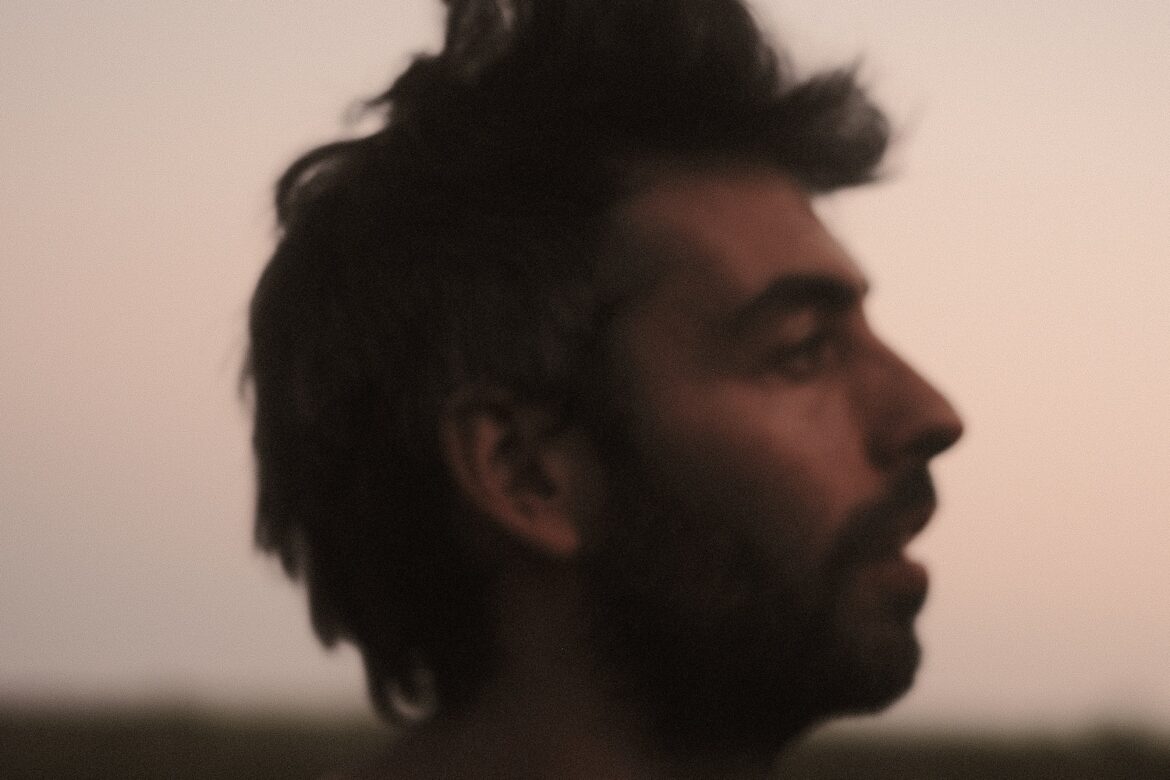
 © Natalie Michelle
© Natalie Michelle